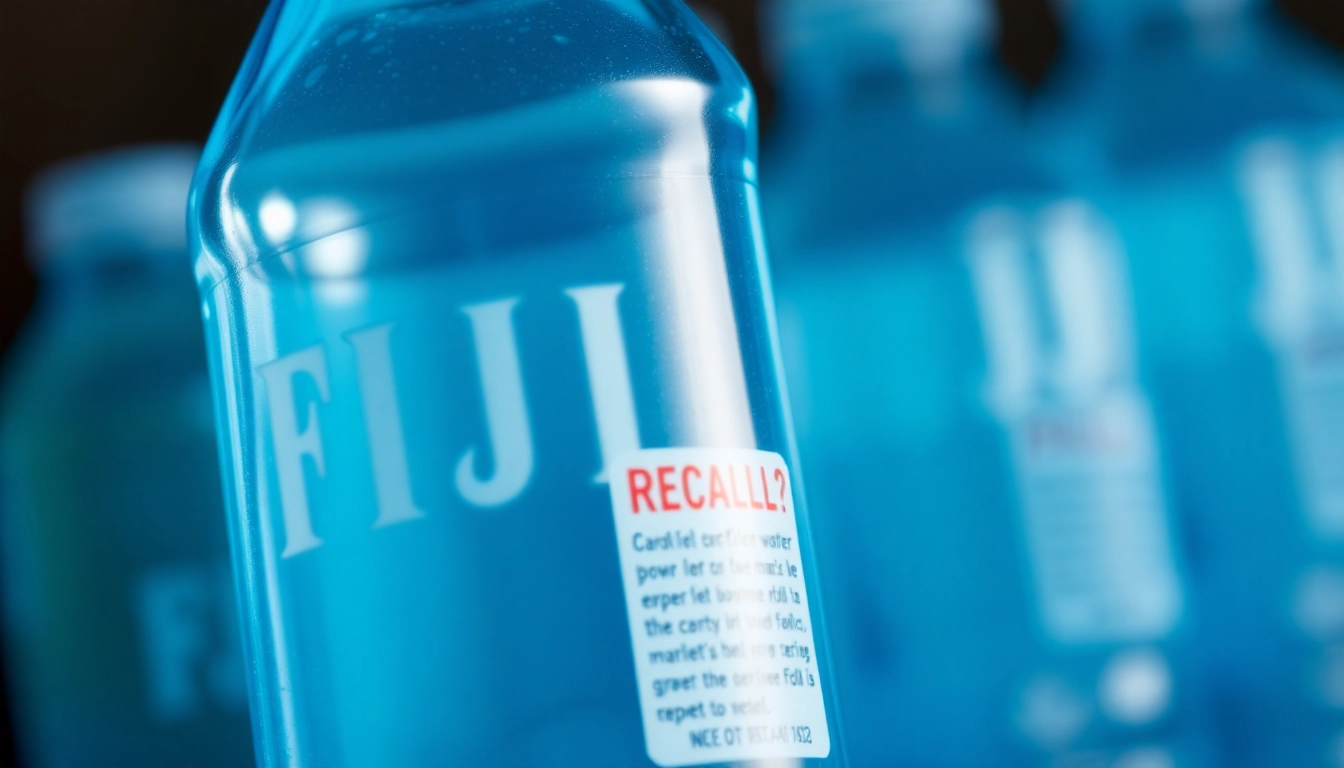Overview of the Fiji Water Recall 2024
In the spring of 2024, a significant event unfolded in the bottled water industry, particularly affecting one of the most renowned brands, Fiji Water. The recall initiated by Fiji Natural Artesian Water, a subsidiary of Natural Waters of Viti Limited, attracted national attention due to the scale of the affected products and the reasons behind the recall. Nearly 1.9 million bottles were recalled across the United States, igniting concerns among consumers and stirring conversations about water safety standards. With the fiji water recall 2024 raising alarm, understanding the details, reasons, and potential health implications becomes essential for all consumers.
Details of the Recall Announcement
On March 4, 2024, the Food and Drug Administration (FDA) made a public notification regarding the recall. Testing conducted on samples of Fiji Water indicated the presence of manganese—a mineral that, in high concentrations, can pose health risks—along with bacteria that could lead to serious health concerns if ingested. This announcement prompted the company to take immediate action to remove affected products from distribution channels, including major retailers and online platforms like Amazon.
Reasons Behind the Recall
The primary reason for the 2024 Fiji Water recall was the detection of manganese and potentially harmful bacteria in the bottled water. Manganese, while an essential nutrient in trace amounts, can be toxic in larger quantities. The specific bacteria identified during testing included various genera that have been linked to gastrointestinal issues. This combination raised red flags about the water’s safety, compelling the brand to undertake a comprehensive recall.
Impacted Products and Distribution
The recall primarily targeted the Fiji Natural Artesian Water sold in 500 mL bottles, specifically packaged in 24-count cases. The bottled water was sold through various retail channels, including grocery stores, convenience stores, and the Amazon platform. The widespread availability of the affected product complicates the recall process, as consumers might have purchased these bottles without awareness of the potential contamination risks.
Health Risks Associated with Contaminated Fiji Water
The health implications of consuming contaminated water are critical to understand, especially in the wake of a significant product recall such as this one. The presence of high levels of manganese and certain bacteria in Fiji Water raised several concerns that consumers should be aware of.
Understanding Manganese and Bacteria Contamination
Manganese is an essential element that plays a role in several bodily functions, including bone formation and metabolism. However, excessive consumption can lead to various health issues. Long-term exposure to high levels of manganese can result in neurological effects similar to Parkinson’s disease. In the case of Fiji Water, the levels detected exceeded the amounts considered safe for consumption, particularly for vulnerable populations such as children and pregnant women.
The bacterial contamination in some batches presents another serious risk. Bacteria, such as E. coli and Salmonella, can cause severe gastrointestinal distress, potentially leading to symptoms such as vomiting, diarrhea, and dehydration. Understanding the specific types of bacteria involved is crucial for evaluating their potential danger.
Possible Symptoms from Consumption
For those who may have consumed the affected Fiji Water, symptoms related to manganese toxicity and bacterial infections may vary:
- Manganese Toxicity Symptoms: Nausea, vomiting, dizziness, fatigue, and in severe cases, neurological changes.
- Bacterial Infection Symptoms: Abdominal cramps, diarrhea (which may be bloody), fever, and vomiting, which are common with bacterial gastroenteritis.
Individuals who experience these symptoms after drinking Fiji Water should seek medical attention, especially if the symptoms persist or worsen.
Expert Recommendations for Safety
Health experts and safety authorities recommend that consumers avoid drinking any bottles of Fiji Water that might be part of the recall. Those who have purchased these products should closely monitor their health and be alert to any symptoms mentioned above. Additionally, consumers should stay informed through reliable sources such as local health departments or the FDA’s website for updates on the recall and related safety information.
How to Identify Affected Fiji Water Bottles
Identifying whether your Fiji Water bottles are part of the recall is essential for ensuring safety. Several key factors can help consumers ascertain the batch numbers and UPC codes relevant to the recall.
UPC Codes and Batch Numbers
The affected Fiji Water bottles can be identified by specific UPC codes and batch numbers. The following codes have been confirmed as part of the recall:
- Case UPC Code: 6 32565 00004 3
- Bottle UPC Code: 6 32565 00001 2
- Batch Codes: Nov. 11, 2023, Nov. 12, 2023, Nov. 13, 2023, Nov. 24, 2023, Nov. 25, 2023
Consumers should check these codes against their bottled water to determine if they need to take further action.
Packaging and Labeling Information
In addition to UPC codes, consumers should inspect the packaging for specific labeling information that could signify whether the water is part of the recall. Attention to detail in the packaging can aid in ensuring that only safe products are consumed. Consumers should look for clear indications of the product’s origin, production date, and selling retailer, which could help trace the water back to its respective batch.
Where to Check for Updates
Regularly checking reputable sources for updates on the recall is imperative. The FDA is the primary source for recall notices and health advisories. Consumers can also visit Fiji Water’s official website or follow news outlets for further developments and instructions regarding the recall.
Steps to Take if You Have Recalled Products
If you find that you possess bottles of Fiji Water that are part of the recall, several steps should be taken to address the issue effectively.
Immediate Actions for Consumers
First and foremost, stop using the recalled bottles of Fiji Water immediately. Chemicals and bacteria can present health risks; therefore, avoiding consumption is crucial. Next, consumers should store the bottles safely away from other food and drink products to prevent accidental consumption.
How to Request a Refund or Exchange
Fiji Water has established protocols for customers to request refunds or exchanges for recalled products. Consumers are encouraged to retain their purchase receipts, as this will be required for processing any refunds. Requests can generally be submitted through the company’s customer service communication channels, whether via phone or the official website.
Contact Information for Customer Support
For specific concerns regarding the recall, customers should reach out directly to Fiji Water’s customer service. Contact details can usually be found on the product packaging or the company’s official website. It is advisable to have information related to the purchase readily available when making inquiries.
Future Implications for Fiji Water Brand
The fallout from the Fiji Water recall could have long-lasting effects on the brand and its eventual recovery and reputation in the market.
Expectations for Quality Control Improvements
In the aftermath of the recall, consumers and industry experts will be closely monitoring Fiji Water’s response regarding improvements to quality control measures. The expectation is that the company will implement stricter testing protocols and batch monitoring to ensure product quality and safety. This could involve investing in advanced technology for testing that can detect contaminants at earlier stages of production.
Impact on Brand Reputation
Brand reputation, particularly in the food and beverage sector, is crucial for consumer trust and market performance. The recall could negatively impact Fiji Water’s brand image, as customers may question the integrity and safety of its products. However, transparent and proactive communication regarding the recall and subsequent improvements could mitigate some of this distrust over time.
Consumer Trust and Market Position
The brand’s market position could also be affected by the incident. Competitors may leverage this situation to capture market share, particularly if they maintain a strong focus on safety and quality. Therefore, Fiji Water must establish itself as a leader in quality assurance in the bottled water market to restore consumer trust and stabilize its market standing.
In conclusion, the Fiji Water recall of 2024 serves as a critical reminder of the importance of safety and quality assurance in the bottled water industry. Awareness and knowledge around the recall are vital for consumers, and proactive steps can help manage potential health risks associated with the consumption of contaminated products. It remains imperative for brands to prioritize consumer safety to navigate the challenges posed by product recalls effectively.



